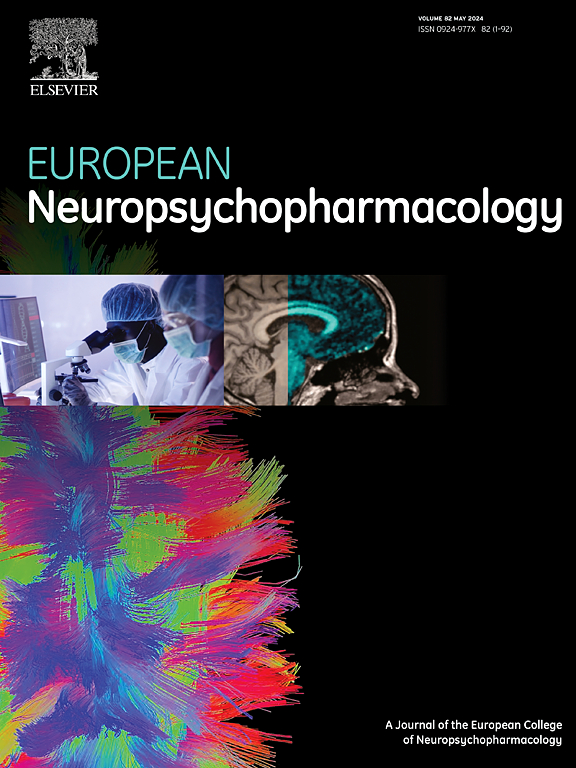使用重复测量法提高全基因组关联研究(GWAS)的精度和功率
IF 6.1
2区 医学
Q1 CLINICAL NEUROLOGY
引用次数: 0
摘要
全基因组关联研究(GWAS)对于了解复杂性状的遗传学至关重要。然而,大多数 GWAS 只使用了一次的数据,即使是在重复评估的纵向研究中也是如此。像抑郁症这样的性状往往存在测量误差。使用更精确的抑郁症纵向表型可以减少测量误差,提高抑郁症 GWAS 的功率和精确度,从而进一步加深对抑郁症遗传学的理解。我们使用了英国生物库(UK Biobank)(最多 n=462,566)中关于 PHQ-2 的数据,PHQ-2 是一种抑郁症状测量方法,在大约 17 年的时间里进行了 8 次评估。我们测试了一个 GWAS 基线模型(传统的横断面 GWAS,采用第一次观察到的评估结果)和其他四个纵向 GWAS 模型:1)所有评估的平均值;2)结构方程模型(共同因素模型);3)精确加权收缩模型;4)基因组SEM模型。在欧洲血统中,所有纵向 GWAS 模型的表现都优于 GWAS 基线模型,其中最强大的模型是精确加权收缩模型,该模型确定了 169 个全基因组重要的单核苷酸多态性(SNPs)。重要的是,与基线模型相比,这种精确加权收缩方法增加了 34 个先导 SNPs(增加 121%)、107 个独立重要 SNPs(增加 173%)、50 个映射基因(增加 35%)和更大的 SNP 遗传性(增加 35%)。外部队列的多基因预测也解释了更大比例的变异(增加 17%)。在南亚和非洲基线模型中没有发现 GWAS 引导 SNP,但在精确加权收缩方法中分别发现了 2 个和 7 个新的引导 SNP。利用 GWAS 中的重复信息似乎提高了发现抑郁症新生物学基础的能力和精确度,这可能是由于测量误差的减少和能力的提高。这些方法可应用于精神遗传学中的其他噪声性状,并可用于在较小规模的研究中检测新的基因座。本文章由计算机程序翻译,如有差异,请以英文原文为准。
USING REPEATED MEASURES TO IMPROVE THE PRECISION AND POWER OF GENOME-WIDE ASSOCIATION STUDIES (GWAS)
Genome Wide Association Studies (GWAS) have been vital to understanding the genetics of complex traits. However, the majority of GWAS use data from only one occasion, even in longitudinal studies with repeated assessments. Traits like depression are often subject to measurement error. Using a more precise and longitudinal phenotype of depression could reduce measurement error and increase power and precision in depression GWAS, further enhancing understanding of the genetics of depression.
We used data from the UK Biobank (max n=462,566) on the PHQ-2, a measure of depressive symptoms assessed up to 8 occasions over approximately 17 years. We tested a GWAS baseline model (a traditional cross-sectional GWAS that took the first observed assessment) against four other longitudinal GWAS models: 1) the mean of all the assessments, 2) a structural equation model (common factor model), 3) a precision-weighted shrinkage model and 4) a genomicSEM model. We also conducted analysis across multiple ancestries and performed out of sample polygenic prediction.
All longitudinal GWAS models outperformed the GWAS baseline model in European ancestries, with the most powerful model being the precision-weighted shrinkage model which identified 169 genome wide significant single nucleotide polymorphisms (SNPs). Importantly, this precision-weighted shrinkage method had an increase of 34 more lead SNPs (121% increase), 107 more independent significant SNPs (173% increase), 50 more mapped genes (35% increase) and a greater SNP heritability (35% increase), compared to the baseline model. Polygenic prediction into an external cohort also explained a greater proportion of variance (17% increase). There were no GWAS lead SNPs identified in the South Asian and African baseline models, but 2 and 7 novel lead SNPs in the precision-weighted shrinkage methods, respectively.
Leveraging repeated information within GWAS appears to improve power and precision to detect novel biological underpinnings in depression. This is likely due to a reduction in measurement error and increased power. These methods can be applied to other noisy traits within psychiatric genetics and could be useful for detecting novel loci in smaller studies.
求助全文
通过发布文献求助,成功后即可免费获取论文全文。
去求助
来源期刊

European Neuropsychopharmacology
医学-精神病学
CiteScore
10.30
自引率
5.40%
发文量
730
审稿时长
41 days
期刊介绍:
European Neuropsychopharmacology is the official publication of the European College of Neuropsychopharmacology (ECNP). In accordance with the mission of the College, the journal focuses on clinical and basic science contributions that advance our understanding of brain function and human behaviour and enable translation into improved treatments and enhanced public health impact in psychiatry. Recent years have been characterized by exciting advances in basic knowledge and available experimental techniques in neuroscience and genomics. However, clinical translation of these findings has not been as rapid. The journal aims to narrow this gap by promoting findings that are expected to have a major impact on both our understanding of the biological bases of mental disorders and the development and improvement of treatments, ideally paving the way for prevention and recovery.
 求助内容:
求助内容: 应助结果提醒方式:
应助结果提醒方式:


